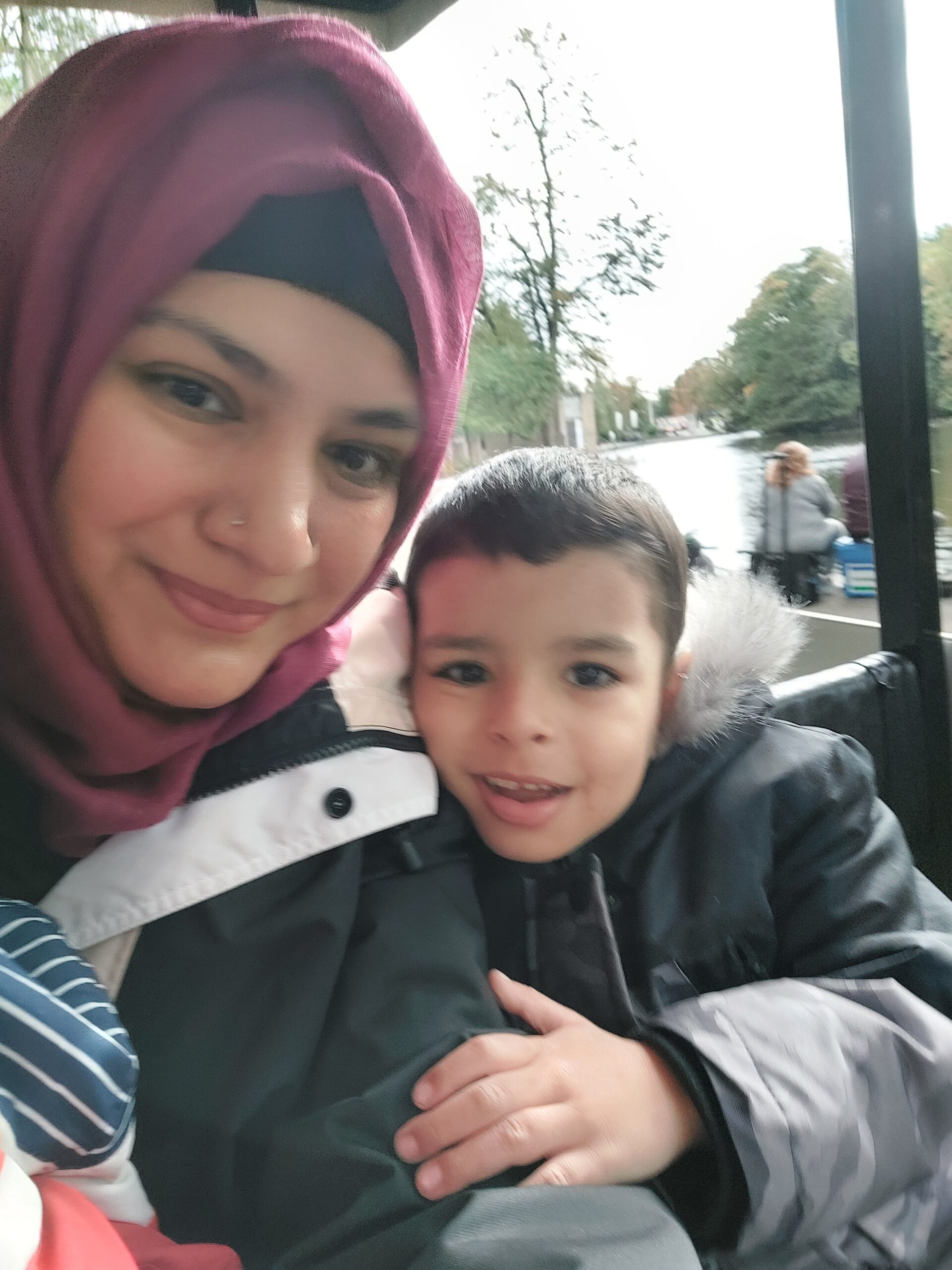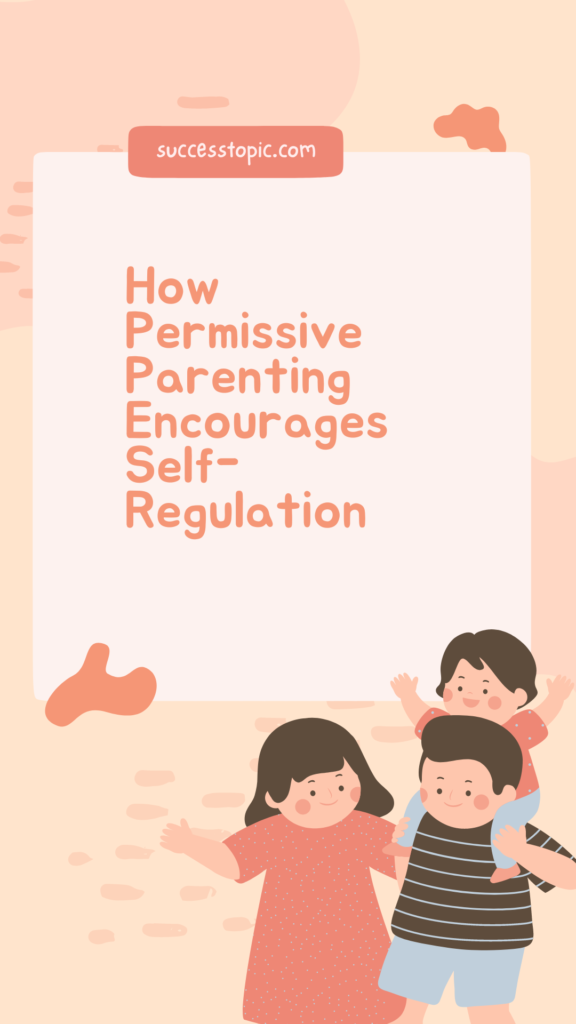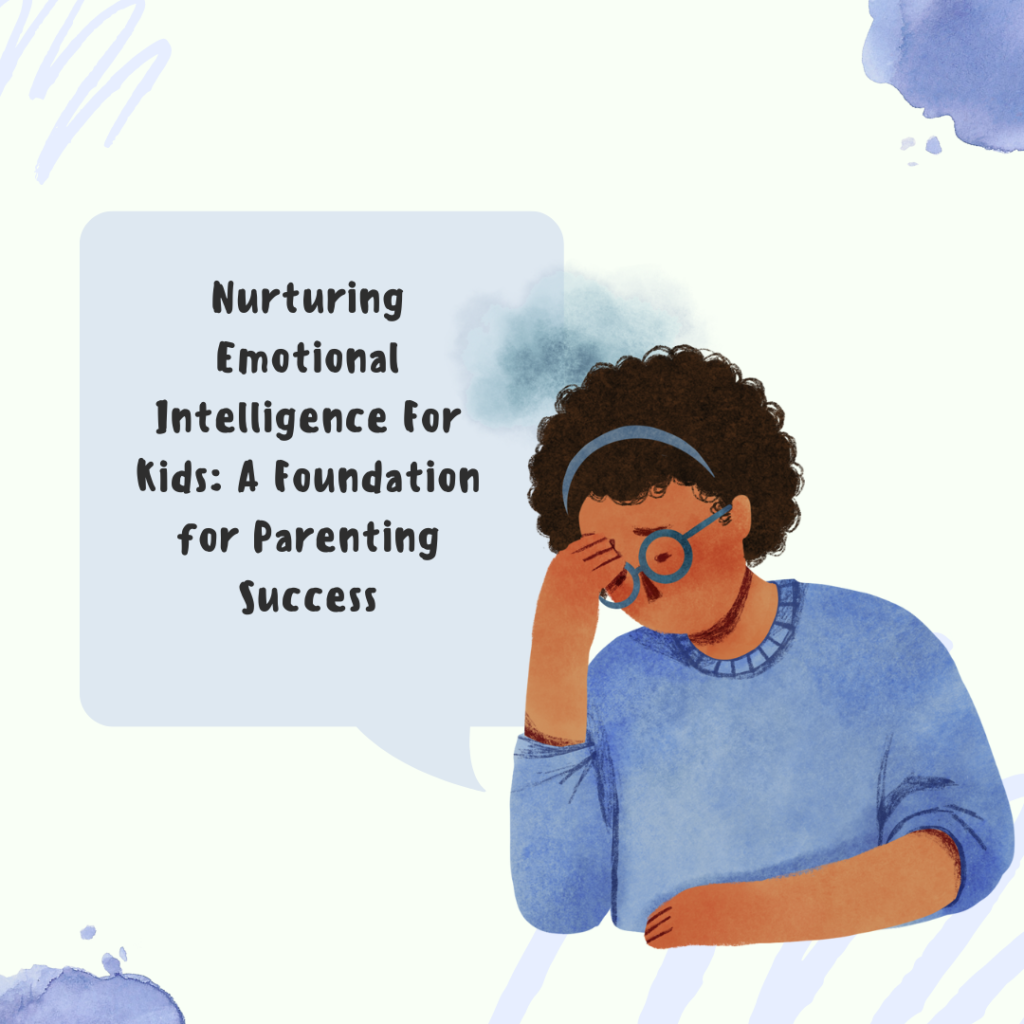
Emotional intelligence is critical to a child’s overall development and success in life. As parents, we can shape and nurture our children’s emotional intelligence from a young age. By understanding what Emotional intelligence for kids is and implementing strategies to cultivate it, we can lay a strong foundation for our children’s future well-being and success.
What is Emotional Intelligence?
Emotional intelligence, often referred to as EQ, is the ability to understand and manage our own emotions and recognize and empathize with the emotions of others. It encompasses a range of skills, including self-awareness, self-regulation, empathy, and good interpersonal communication.

What is Emotional Intelligence for Kids?
Emotional intelligence for kids refers to their ability to understand, manage, and express their emotions effectively, as well as recognize and empathize with the emotions of others. It involves self-awareness, self-regulation, empathy, and good interpersonal communication skills.
Emotional intelligence for kids is a work in progress that develops over time. As they grow, they learn to identify and label their emotions, understand the causes and consequences of their feelings, and learn how to express themselves in healthy ways.
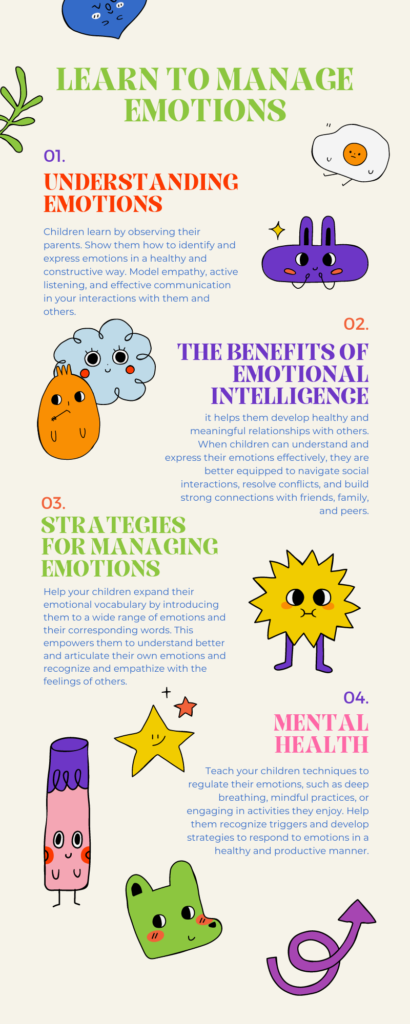
Emotional intelligence for kids has numerous benefits. It helps them manage their challenges, particularly for those with learning and thinking differences. It also enhances their ability to build and maintain positive relationships, resolve conflicts, and navigate social interactions. Additionally, it contributes to academic success, self-esteem, resilience, and the ability to regulate one’s emotions.
Parents play a crucial role in nurturing their children’s emotional intelligence. They can model emotional intelligence by demonstrating how to appropriately identify, express, and manage emotions. Creating a safe and non-judgmental environment for children to express their emotions, teaching them emotional vocabulary, and encouraging problem-solving skills are also effective strategies. Furthermore, fostering empathy, kindness, and emotional regulation through various activities and experiences contributes to the development of Emotional intelligence for kids.
The Importance of Emotional Intelligence in Parenting
Nurturing Emotional intelligence for kids is crucial for several reasons.
Parenting requires a great deal of emotional intelligence. Specifically, parents with high emotional intelligence can regulate their negative emotions, set clear boundaries, communicate effectively, and show empathy to their children. By being emotionally intelligent, parents can greatly improve their relationships with their children and create a more positive and supportive environment for their development.
First and foremost, it helps them develop healthy and meaningful relationships with others. When children can understand and express their emotions effectively, they are better equipped to navigate social interactions, resolve conflicts, and build strong connections with friends, family, and peers.
Emotional intelligence for kids also plays a vital role in academic success. Research has shown that children with higher levels of emotional intelligence tend to perform better academically, have higher self-esteem, and exhibit greater resilience in the face of challenges. They can better manage stress, adapt to new situations, and regulate their emotions, which enhances their overall well-being and boosts their performance at school.
Benefits of Emotional Intelligence in Parenting
Improved communication
Emotional intelligence for kids allows parents to communicate effectively with their children. Emotional intelligence involves an awareness of one’s emotions, which can help parents better understand their reactions to situations and their children’s. Parents with high emotional intelligence can model effective communication and create a supportive and open dialogue with their children.
Better problem-solving
Emotional intelligence for kids helps parents to approach problems calmly and rationally, rather than acting impulsively or reacting out of frustration. This can help them devise effective solutions to problems and model problem-solving skills for their children.
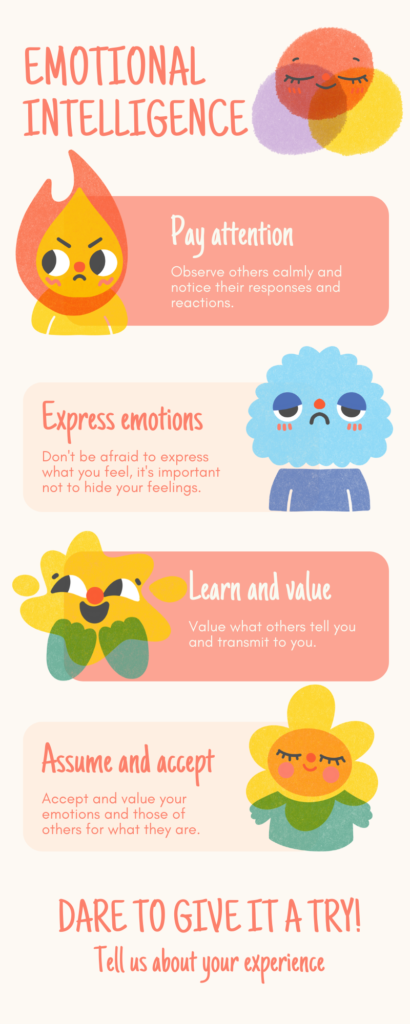
Enhanced empathy and connection
Parents with high emotional intelligence are more likely to be empathetic towards their children, which leads to stronger connections and feelings of security for the child. When parents can accurately understand and respond to their children’s emotions, it helps them to build a sense of safety and trust within their relationship.
Positive modeling
Children learn much about emotional intelligence from their parents, who act as models for how emotions are expressed and managed. By modeling emotional intelligence for their children, parents can help instill these skills in them and set them up for success in their future endeavors.
Better mental health
Parents with high emotional intelligence can better model how to handle challenging emotions and can help their children learn coping mechanisms. This helps children to develop strong mental health and a healthier approach to emotional expression.
Strategies for Nurturing Emotional intelligence for kids
Model Emotional Intelligence
Children learn by observing their parents. Show them how to identify and express emotions in a healthy and constructive way. Model empathy, active listening, and effective communication in your interactions with them and others.
Here are some key strategies:

Self-awareness: Start by developing your own self-awareness. Pay attention to your own emotions, triggers, and reactions. Identify and understand your emotional patterns and how they impact your behavior.
Emotion regulation: Practice regulating your own emotions effectively. This means learning to manage and express your emotions in a healthy and constructive manner. Take deep breaths, use positive self-talk, or engage in activities that help you relax and de-stress.
Active listening: Show genuine interest and empathy when others express their emotions. Focus on understanding their perspective without judgment or interrupting. Reflect on what they say to ensure you fully comprehend their emotions.
Empathy: Put yourself in someone else’s shoes and try to understand their emotions from their point of view. Show empathy by validating and acknowledging their feelings. Offer support and reassurance when needed.
Effective communication: Develop strong communication skills to express your emotions and thoughts clearly and respectfully. Use “I” statements to express how you feel without blaming others. Practice active listening and strive for open and non-judgmental conversations.
Conflict resolution: Learn to resolve conflicts in a calm and respectful manner. Use empathy and active listening to understand the other person’s perspective. Seek solutions that are mutually beneficial and consider the emotions and needs of all parties involved.
Emotional intelligence in relationships: Apply emotional intelligence principles to your relationships. Foster a supportive and understanding environment where emotions can be openly expressed and discussed. Show appreciation for others’ emotions and encourage open communication.
Role modeling: Be a positive role model for emotional intelligence. Demonstrate healthy emotional expression, regulation, and empathy in your own behavior. Children and others around you will learn from observing these qualities in action.
Continuous learning: Emotional intelligence is a developing skill that can be improved over time. Stay curious and open-minded, seek resources such as books or workshops on emotional intelligence, and continue to learn and grow in this area.
Encourage Emotional Expression
Create a safe and non-judgmental environment for your children to express their emotions. Validate their feelings and provide them with the space to articulate their thoughts and emotions openly.
Teach Emotional Vocabulary
Help your children expand their emotional vocabulary by introducing them to a wide range of emotions and their corresponding words. This empowers them to understand better and articulate their own emotions and recognize and empathize with the feelings of others.
Here are some strategies to help teach emotional vocabulary:
Modeling: Start by modeling emotional vocabulary and expressions yourself. Use words to describe your own feelings and emotions. For example, instead of saying, “I’m fine,” express how you are truly feeling, such as “I’m feeling sad today.”
Identifying emotions: Encourage individuals to identify and label their emotions accurately. Use visual aids such as emotional charts to help individuals recognize and name different emotions. For instance, use pictures or diagrams to help explain emotions like anger, fear, joy, and sadness.
Discussing emotions: Create an environment where individuals feel comfortable discussing their emotions. Cultivate a non-judgmental and supportive setting where individuals can express their feelings. Encourage open communication and active listening.
Reading and storytelling: Read books or watch movies that illustrate different emotions and discuss the characters’ experiences. Incorporate storytelling to help individuals connect with different emotions and learn how to express their emotions healthily.
Play and creativity: Use play and creative activities to encourage emotional expression. For example, draw or paint emotions, play emotional charades, or use puppets or dolls to help express emotions.
Practice and repetition: Reinforce emotional vocabulary through consistent practice and repetition. Use daily check-ins to encourage individuals to express how they are feeling and name their emotions. Continue to use visual aids and other tangible tools to help individuals associate words with different emotions.
Practice Problem-Solving Skills
Encourage your children to identify and problem-solve challenging situations on their own. This helps them develop resilience, critical thinking skills, and self-confidence in managing their emotions and finding solutions.

Promote Emotional Regulation
Teach your children techniques to regulate their emotions, such as deep breathing, mindful practices, or engaging in activities they enjoy. Help them recognize triggers and develop strategies to respond to emotions in a healthy and productive manner.
Foster Empathy and Kindness
Engage in activities that promote empathy and kindness towards others. Encourage your children to step into someone else’s shoes and consider their feelings. Volunteer together as a family or engage in acts of kindness that foster a sense of compassion and understanding.
How as a parent, you can develop Emotional intelligence in Your Kids
Once upon a time, a young boy named Nathan was very shy and had difficulty expressing his emotions. His parents, Sarah and David, noticed Nathan often became overwhelmed with sadness or frustration but struggled to communicate his feelings.
Sarah and David understood the importance of developing emotional intelligence in their child, so they decided to take a proactive approach. They began by creating a safe and non-judgmental space for Nathan to express his emotions.
One day, after Nathan had a particularly challenging day at school, he came home feeling upset and angry. Instead of dismissing his feelings or telling him to “toughen up,” Sarah and David sat down with Nathan and asked him about what had happened. They actively listened to him without interrupting, giving him their full attention.
As Nathan shared his experience, he became more comfortable expressing his emotions. Sarah and David acknowledged his feelings, validating them by saying things like, “It sounds like you had a tough day, and that can be really frustrating.” They also asked open-ended questions to encourage Nathan to delve deeper into his emotions, saying, “How did that make you feel?” and “Is there anything we can do to help?”
By creating this empathetic and open space, Nathan felt understood and supported. Sarah and David taught him that having and expressing emotions is okay. They also helped him identify and label his feelings, strengthening his emotional vocabulary.
To further develop Nathan’s emotional intelligence, Sarah and David engaged him in activities that allowed him to explore and better understand emotions. They read books together about characters who faced various emotional challenges and discussed how those characters might have felt.
Additionally, Sarah and David practiced emotional regulation exercises with Nathan, such as deep breathing or taking a break to calm down when feeling overwhelmed. They showed him that it’s normal to experience strong emotions but that there are healthy ways to manage them.
Over time, Nathan began to show significant improvement in managing his emotions. He became more self-aware and was better able to communicate his feelings. Sarah and David noticed that their bond with Nathan deepened as he became more confident in expressing himself and developed stronger relationships with his peers.
In this story, Sarah and David demonstrated how parents could develop emotional intelligence in their children. By creating a safe and non-judgmental space, actively listening, validating emotions, and providing opportunities for emotional exploration and regulation, they helped Nathan grow into a child with strong emotional intelligence.
Remember, every child is unique, and it may take time and patience to develop emotional intelligence. However, with consistent effort and support, parents can play a crucial role in nurturing their children’s emotional intelligence and setting them up for success in managing their emotions throughout their lives.
The Long-Term Benefits
Investing in nurturing Emotional intelligence for kids sets them up for long-term success. It equips them with essential life skills contribute to healthy relationships, effective communication, and emotional well-being. By fostering emotional intelligence for kids, parents provide their children with a solid foundation for navigating the complexities of life and achieving personal and professional success.
Wrap up
In conclusion, nurturing emotional intelligence for kids is a cornerstone of parenting success. By understanding the importance of emotional intelligence and implementing strategies to cultivate it, parents can lay the groundwork for their children’s overall well-being and future success. Parents can shape their children into emotionally aware and thriving individuals through modeling, encouragement, teaching, and fostering empathy.
It is a skill set that develops over time and can be nurtured through parental guidance and support. By fostering emotional intelligence, parents can help their children navigate the complexities of emotions, relationships, and personal growth.

